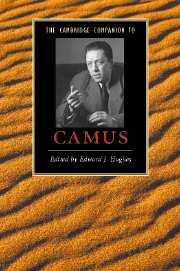Book contents
- Frontmatter
- Introduction
- PART I: BIOGRAPHY AND INFLUENCES
- 1 Camus: a life lived in critical times
- 2 Situating Camus: the formative influences
- 3 Autobiographical soundings in L’Envers et l’Endroit
- PART II: THEMES, PREOCCUPATIONS AND GENRES
- PART III: TEXTS AND CONTEXTS
- Postface
- Guide to Further reading
- Index
- Series List
2 - Situating Camus: the formative influences
from PART I: - BIOGRAPHY AND INFLUENCES
Published online by Cambridge University Press: 28 September 2007
- Frontmatter
- Introduction
- PART I: BIOGRAPHY AND INFLUENCES
- 1 Camus: a life lived in critical times
- 2 Situating Camus: the formative influences
- 3 Autobiographical soundings in L’Envers et l’Endroit
- PART II: THEMES, PREOCCUPATIONS AND GENRES
- PART III: TEXTS AND CONTEXTS
- Postface
- Guide to Further reading
- Index
- Series List
Summary
When speaking of formative influences on Camus, it would be a mistake to concentrate exclusively on the 'great' names: Nietzsche, Dostoyevsky, Gide, and so on. Like any French boy with a passion for reading, the young Albert Camus lived largely on a diet of adventure stories, among which the historical series about the swashbuckling hero Pardaillan by Michel Zévaco took pride of place (Sartre acknowledges his own debt to this series in his autobiographical text, Les Mots (Words)). Well before he was a confident reader himself, he was moved by Roland Dorgelès's First World War novel of the trenches Les Croix de bois (The Wooden Crosses), which his revered primary teacher Louis Germain used to read to the pupils at the end of term and on other special occasions: it introduced him to a different form of heroism from that of Pardaillan, and provided an essential link with his own father, who had died before Albert was two, from wounds received at the Battle of the Marne.
At the Grand Lycée in Algiers, where Camus discovered a totally different world from that of the rough working-class district of Belcourt where he grew up, the author who appealed most to him was probably Molière. The implications of that are still to be explored, both for his dramatic practice and for his often unrecognised humour. humour. By the age of sixteen, in the classe de première, he was beginning to explore outside the school syllabus, and that was the year his uncle Gustave Acault lent him André Gide’s Les Nourritures terrestres (Fruits of the Earth). Gide’s lyrical celebration of heady, sensual pleasure did not immediately speak to him. ‘A Alger, à seize ans, j’étais saturé de ces richesses; j’en souhaitais d’autres, sans doute’ (Ess, 1117) (‘In Algiers, at sixteen, I was saturated with these riches; no doubt I was looking for something else’). It was in the following year, 1930–1, that Camus encountered the man who was to unlock the world of books and ideas for him.
- Type
- Chapter
- Information
- The Cambridge Companion to Camus , pp. 26 - 38Publisher: Cambridge University PressPrint publication year: 2007
- 1
- Cited by

